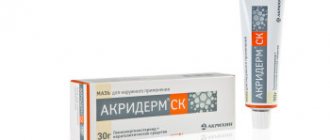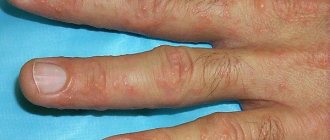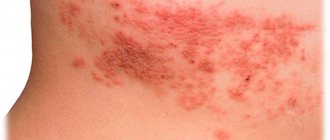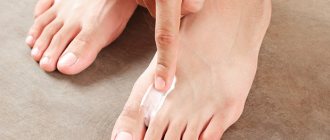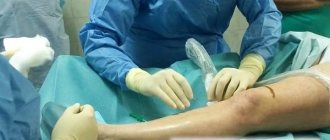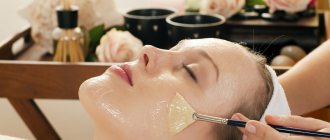When a person is diagnosed with psoriasis in a particular area of the body, treatment at home involves the use of various types of pharmaceuticals available in the form of tablets, ointments, creams and sprays. Despite the fact that each product can be used independently at home, the attending dermatologist should prescribe the drugs and the regimen for their use.
Sprays for the treatment of psoriasis
At home, it is very convenient to use drugs in the form of sprays. The main advantage of this dosage form is that when spraying the spray, its active components are evenly distributed over the surface of the skin. For therapeutic purposes for skin psoriasis, the following types of sprays are used:
- Spray 999. This drug can be used on an ongoing basis. The product must be sprayed over the surface of the skin from a distance of 15 cm. Spray 999 does not contain steroid hormones and also does not leave marks on our clothes and skin.
- Skin Cap. The manufacturers of this product are the United States of America, which causes the high cost of the spray. Aerosol Skin-Cap also does not contain glucocorticosteroids, so it can be used from an early age. According to the instructions, the aerosol is sprayed at a distance of 17-20 cm from the surface of the skin, 3 times a day. As a rule, one week of daily use is enough to transfer the disease from a state of exacerbation to a state of remission.
- Beauty Balance. The spray contains an extract from grape seeds, so it can be used during pregnancy and breastfeeding. For therapeutic purposes, it is necessary to spray the drug at a distance of 15 cm from the skin 2 times a day.
Reasons for the development of psoriasis
The development of psoriasis is based on a number of causes and predisposing factors, but none of them has scientific confirmation. Doctors in the field of dermatology are inclined to believe that psoriasis can develop for the following reasons:
- heredity;
- metabolic disorder;
- autoimmune disorders;
- pathologies of the endocrine system;
- neurological disorders;
- severe emotional shock, stress, depression.
There are other reasons for the development of psoriasis, but in any case, they are non-infectious in nature and indicate internal disorders of the body. Many people believe that psoriasis is a contagious disease, but this opinion is erroneous, since it is impossible to become infected with these diseases.
Ointments for the treatment of psoriasis
For external application to the area of psoriatic skin lesions, preparations in the form of ointments are used, containing and not containing hormonal components. The most effective and safe ointments for psoriasis will be discussed below.
Flucinar
Can be used for medicinal purposes in children over 2 years of age. The drug is applied once a day, and the total duration of treatment should not exceed 2 weeks. If facial skin is affected, the duration of therapy is reduced to 7 days. The drug contains a glucocorticosteroid component, an overdose of which can be dangerous to the body.
Belosalik
This combination drug contains not only a glucocorticosteroid component (betamethasone dipropionate), but also salicylic acid, which has an antimicrobial effect. The components of Belosalik ointment have anti-edematous, anti-inflammatory, keratolytic, vasoconstrictive and antiproliferative properties. Before applying the ointment, it is recommended to rinse the damaged area of skin with water and dry with a paper towel.
Sinaflan
The ointment contains a steroid component and therefore cannot be used for long-term treatment. The total duration of treatment with Sinaflan ointment is 1 week. For therapeutic purposes, the product is applied to damaged areas of the skin in a thin layer, 2 times a day. With the use of this drug, the process of skin regeneration starts within 2-3 days.
Preparation
To make the prepared medicine more effective, you need to prepare the skin in advance. A daily bath using warm water is suitable for this. Plant extracts, decoctions of herbs, and plants characterized by antimicrobial and anti-inflammatory properties should be added to the water. For example, celandine, chamomile, string, calendula and sage. It is recommended to stay in the liquid for about 20 minutes.
Therapeutic therapy with homemade ointments will become much more effective if the person suffering from the disease tunes in for a long course. Only following the doctor's recommendations will help fight the disease.
Creams for the treatment of psoriasis
In the treatment of psoriatic skin lesions, medications in the form of creams are quite effective. The list of the most effective drugs includes the following names:
- Akriderm. This potent medicinal drug has a pronounced anti-inflammatory, antiallergic and anti-edematous effect. Tangible results from using Akriderm can be obtained from the first day of treatment. According to the instructions, the cream is applied 2-3 times a day to psoriasis lesions.
- Betaderm. The drug contains a glucocorticosteroid component, so the course of treatment with the drug should not last more than 2 weeks. To relieve the symptoms of psoriasis, it is recommended to apply a thin layer of the product to the damaged areas 1-2 times a day.
Clinical signs of psoriasis
The symptoms of psoriasis are pronounced, accompanied by periods of remission and exacerbation, directly depend on the form of the disease. Basically, signs of the disease are the appearance of rashes on the skin, elbows, palms, and genitals. The lesions are red, rough to the touch, and covered with scales. The rashes can have different sizes, merge into one large lesions, and be very itchy. Cracks appear on the inflamed skin, and small ulcers may form. If treatment measures are not taken, there is a risk of secondary infection, which significantly complicates the course of the disease and the treatment itself.
Tablets for the treatment of psoriasis
In case of severe psoriatic process, the patient may be prescribed the combined use of external agents and drugs in tablet form. After agreeing with the doctor on the names and dosages of the tablets, they can be taken independently at home. To restore the process of normal regeneration of skin cells, medications in the form of tablets such as Psorilom, Methotrexate and Neotigazon are used. Each drug has a powerful effect on the human body and can cause adverse reactions.
Causes and signs of pathology
Psoriasis is not difficult to recognize.
The disease manifests itself first as single, then as multiple rashes on the skin - so-called “psoriatic plaques”. They are convex, raised, inflamed spots of a reddish-pink color, the surface of which is abundantly strewn with silver-gray scales (removed with the slightest mechanical impact). The spread of rashes throughout the body is associated with a host of local and general symptoms:
- Itching, peeling, hyperemia, swelling in the affected areas;
- Decreased performance, apathy, nervousness and depression;
- Dizziness, weakness, and during periods of exacerbation of the disease - increased body temperature.
Lotions for psoriasis
As part of complex therapy for psoriatic skin lesions, Oxypor and Calamine lotions, which do not contain a hormonal component, can be used. Both products, when applied to damaged areas of the skin, slow down the process of epidermal cell division, cool the skin, reduce the intensity of the inflammatory process and eliminate characteristic itching. It is recommended to apply one of the lotions 2 times a day, without using cotton sponges or gauze pads.
In case of severe manifestations of the disease, one of the lotions can be applied up to 4 times a day, after prior agreement with the attending dermatologist. The total duration of treatment is individual, but the duration of therapy should not exceed 1 month. The effect of lotions for psoriasis can be enhanced through their combined use with creams or tablets for oral administration.
Application of sulfur-salicylic ointment
Serno, a salicylic ointment, is often prescribed for psoriasis. It effectively relieves the manifestations of skin ailments. In addition to salicylic acid, it contains petroleum jelly and sulfur. For the treatment of psoriasis, a 2-5% form of the medication is used, which can be purchased in a pharmacy in finished form or ordered from pharmacists.
The drug is an analogue of Salicylic ointment, has local irritant and anti-inflammatory properties, has keratoplastic (-lytic), antiparasitic, antibacterial effects. After use, skin may feel dry and have a sulfurous odor.
Effective treatments
Treatment of psoriasis on the elbows should be carried out in a complex that includes the following:
- taking vitamins,
- dieting,
- external treatment,
- physiotherapy,
- phototherapy.
When treating diseases on the knees, topical medications (ointments, creams) are used. It is possible to prescribe sedatives and antihistamines for complex treatment. If there is excessive bleeding, anti-inflammatory drugs are prescribed.
Treatment of psoriasis on the palms and soles is quite problematic. This is primarily caused by constant irritation of these parts due to friction from clothing and frequent washing. If treatment with external means does not give a positive result, then ultraviolet irradiation is prescribed.
Egg yolk ointments
For the preparation of medicines, it is necessary to use only the yolks of eggs obtained from domestic chicken.
Industrially produced eggs may contain antibiotics and other harmful substances, which can aggravate the pathology.
The yolk of a chicken egg contains a rich set of nutrients, including all the microelements and vitamins necessary for the body. The yolk is especially rich in vitamin D.
Vitamin D plays a role in the development of psoriasis. It has been established that a lack of vitamin D3 provokes an exacerbation of the disease. Many medications for the treatment of psoriatic rashes contain synthesized vitamin D3.
In chicken yolks, vitamin D3 is in the form most absorbed by the body. When applied to the skin, the vitamin relieves inflammation and enhances tissue regeneration.
To treat psoriasis, the following ointment recipes using yolk are used.
Monocomponent ointment made from egg yolks
To prepare the medicine you will need 20 chicken yolks.
Boil the eggs hard until done. Cool and peel. Separate the yolks from the whites. Then heat the frying pan and add the mashed yolks. There is no need to add vegetable oil or butter.
The ointment should be prepared with constant stirring. Care must be taken to ensure that the mixture does not burn. The preparation method is long and painstaking. After an hour, you will notice that an oily liquid is released from the boiled yolks.
The resulting oil contains a large amount of vitamin D. When applied externally, the oil well moisturizes and nourishes keratinized epithelial scales. The nutrients contained in the oil help accelerate the regeneration of epithelial cells.
Carefully separate the oil from the pulp using gauze or a bean bag. The above number of eggs will yield about 10 ml of oil.
The oil should be applied to the affected areas of the skin. When treating with chicken yolk oil, it is necessary to limit exposure to bright sun to avoid an overdose of vitamin D.
Egg yolk ointment with ethanol
To prepare the medicine you will need:
- 4 eggs;
- 150 ml ethanol 70%;
- 150 ml birch tar;
- 80 ml camphor oil.
Get 4 yolks from eggs. Place the yolks in a container and stir. Carefully add the remaining ingredients. Place the resulting mixture in a clean container and store in the refrigerator.
Gently lubricate the psoriatic plaques with the product and leave until completely dry. Then put on clean, loose clothes. It is recommended to let the ointment work for three days. During this period you cannot wash.
After the effect of the drug has expired, you need to wash yourself without using synthetic washing gels and shampoos. For hygiene purposes, you can use tar soap. As a rule, the therapeutic effect is noticeable after the first use.
Directions for use and precautions
To achieve the maximum therapeutic effect and avoid side effects, you need to use the prepared ointments according to all the rules, taking into account precautions.
- When treating psoriasis with home remedies, it is important to provide the skin and nail plates with reliable protection from drying out.
- Herbal preparations must be used in the initial stages of the disease - in this case they are especially effective.
- In order to ensure the maximum therapeutic effect, you should cleanse the skin of scales and crusts before applying the ointment.
- When making an ointment, you must strictly adhere to the recipe, including the set of ingredients and their dosage.
You cannot use several ointments that are incompatible with each other during one treatment course - such an approach will not only reduce the effectiveness of the products, but also provoke side effects.
Treatment approach
External treatment products are prescribed for any type of psoriasis: from the mildest to the most severe.
Depending on the location of psoriatic elements, the doctor may recommend the use of ointments, creams, lotions, shampoos containing active ingredients. Applying medications to the skin helps to cope with pain, exudative phenomena, itching, peeling, and increased trauma to the skin caused by dryness. At the cellular level, drug applications have an antioxidant effect, they reduce the production of cytokines, the proliferation of keratinocytes, promote normal differentiation of epidermal cells, and affect inflammatory mediators.
You should immediately understand that treating psoriasis is not a quick process and is quite complex. Very often, the success of psoriasis treatment depends on how aware the patient is of the possible causes of the disease and the factors that can intensify the symptoms of the disease. It is also very important to know what to avoid if you have psoriasis.
Psoriasis is especially troublesome on the part of the scalp covered with hair. One of the features of the treatment of this type of psoriasis is that it is very difficult to stop the manifestations of psoriasis in this part of the body.
In the initial stage of the disease, most people perceive flakes as ordinary dandruff. The situation is even worse when psoriasis on the head is perceived by others as lichen (and these are not isolated cases).
Many people around them begin to avoid contact with the person, and this causes the patient a lot of unpleasant moments, which only add fuel to the fire in a stressful situation and thereby provoke the development of the disease.
If you suspect psoriasis on the hairy part of the scalp, the patient should immediately contact a dermatologist, who can prescribe adequate treatment with medications and also recommend what changes in the patient’s lifestyle are necessary for the most effective treatment.
Treatment of psoriasis should be comprehensive and comprehensive. By and large, medications are used for treatment (the main effective treatment), physiotherapy (auxiliary treatment) and the right diet (of an auxiliary nature).
Treatment with medications, as a rule, begins with external agents in the form of ointments and sprays. Doctors resort to tablets and droppers for serious and advanced manifestations of psoriasis.
Internal remedies include hormonal drugs (corticosteroids), as well as sedative and restorative drugs. .
Treatment is much more effective when using physiotherapy procedures:
- UV irradiation;
- Phototherapy;
- Laser irradiation.
Of course, you can negate all treatment by eating incorrectly. For this reason, doctors insist on following a proper diet during the course of treatment for psoriasis.
For psoriasis, drugs are also administered orally. Injections for psoriasis are usually divided into five groups.
This:
- Immunomodulators;
- Immunosuppressants;
- Glucocorticosteroids;
- Antihistamines;
- Hepatoprotectors.
Immunomodulators
Drugs in this group suppress symptoms of the disease well and significantly prolong the period of remission, which undoubtedly improves the quality of life of patients.
Many people do not make a difference in treating psoriasis with ointments or creams. However, there is a difference, since ointments use a thicker base and this complicates the passage of medicinal substances through the skin. The creams are based on petroleum jelly, petroleum jelly itself, or propylene glycol or polyethylene glycol. As in the case of ointments, creams are divided into hormonal and non-hormonal.
The most common creams for the treatment of psoriasis are:
- Triderm. This cream is a drug of combined action, since it simultaneously has antipruritic, antibacterial, anti-inflammatory, antiallergic and antifungal effects;
- Dermovate. This cream is used for various forms of psoriasis, with the exception of the most common - plaque. Can have an effect aimed at reducing inflammation, and also relieves itching, swelling and irritation;
- Travocort. Relieves all manifestations of allergies, as well as itching and inflammation;
- Advantan. Hormonal cream is very effective in suppressing the manifestations of allergies and inflammation. It is used not only on smooth skin, but also on skin covered with hair.
Manifestations of psoriasis are characterized by increased skin infiltration, inflammation and peeling of the skin.
For this disease, doctors must prescribe ointments and creams based on the following substances:
- Sere.
- Salicylic acid.
- Dithranol.
- Urea.
These drugs have a drying effect and have an anti-inflammatory effect. Despite the fact that they are not able to completely cure the disease, they reduce the symptoms of psoriasis and make it easier to bear the disease.
In addition to ointments, medications and medications of the glucocorticoid group are widely in demand for psoriasis. Some of them are made in the form of lotions. They are well suited for treating the scalp because they are quickly absorbed into the skin and are not noticeable to others, compared to ointments and creams.
It has been established that psoriasis is a systemic disease, since it is caused by several disruptions in the body, especially if the patient has a genetic predisposition to the pathology. Systemic drugs prescribed for psoriasis are based on synthetic derivatives of vitamin A (retinoids). They have been used for treatment for 20 years, so their effectiveness has been proven.
Psoriatic arthritis is a severe form of psoriasis that spreads to the patient’s joints. This phenomenon is rare, but requires emergency treatment from 2 doctors at once: a dermatologist and a rheumatologist. Specialists will not be able to fully cure the pathology, since even the most powerful drugs for chronic skin psoriasis are not able to remove the pathology from the genetic pillar.
Due to the fact that the palms and feet are often irritated during washing, traditional treatment methods become ineffective or completely ineffective.
In order to eliminate the disease, patients will have to resort to more radical methods of treatment, and carefully adhere to the following recommendations:
- Do not eat spicy, fatty foods or those that have a pronounced taste.
- To refuse from bad habits.
- When working with detergents and cleaning products, protect your hands with household gloves.
- Wash with warm water, not hot.
If there are cracks in the arms and legs, a hydrocolloid solution should be used. Its use reduces irritation caused by itching and friction, and also restores the skin.
To reduce the rate of formation of psoriatic cells and stabilize their development, pathogenetic treatment is used.
For external treatment of the plantar-palmar area, the following is used:
- Retinoids.
- Vitamin D derivatives.
- Glucocorticosteroids.
Additionally, moisturizing and softening creams based on salicylic acid are prescribed to remove dead skin.
In case of insufficient effectiveness, the affected areas are exposed to ultraviolet irradiation, but if these measures are not effective enough, specialists resort to systemic therapy.
The goal of scientists is to remove psoriasis from human genetics, but such a remedy has not yet been developed. New, modern remedies for psoriasis are highly effective, compared to medications invented earlier.
The most popular innovative medications that fight psoriasis are:
- Infliximab. This remedy was used to treat arthritis and other diseases, but the drug showed maximum effectiveness in relation to psoriasis. Despite the benefits of the drug, it is prescribed extremely rarely, since the medication causes severe side effects, such as: sepsis, secondary infection, listeriosis, even the appearance of cancerous tumors.
- Humira, Stelara, Remicade. Biological drugs that suppress the activity of immune cells. The remedies are well suited if the pathology is provoked by immune hyperactivity. As a result, psoriatic plaques disappear and the disease goes into remission.
- Neotigazon, Etretinate, Acitretin, Tigazon. Medicines are classified as retinoids. Regulate skin keratinization and stimulate the restoration of skin cells. You can be treated with tablets for up to 2 months, but you are prohibited from prescribing them yourself, since the drugs have a large list of contraindications for use.
First of all, you need to get examined. Only diagnostics can fully determine all the problems that exist in the body.
Of the total number of patients with psoriasis, some will need hormonal treatment, while others will simply solve the problem through the gastrointestinal tract. Pathogenic microflora becomes a real problem with psoriasis.
Even vitamins will not have the desired effect if there are colonies of fungi and bacteria on the skin and inside the body. Only by eliminating this threat will it be possible to continue treatment.
But it is worth remembering that each type of “microscopic enemies” requires a special combat strategy.
It is worth taking care of your emotional state. Of course, psoriasis is a serious problem, it is unpleasant and does not allow you to live normally. But the stress that a patient experiences during illness does not eliminate its manifestations. It is necessary to direct your emotions in the right direction, to be as nervous and worried as possible, otherwise therapy will be ineffective.
Toxins in psoriasis will also become a hindrance: you should cleanse the body of them. Many experts claim that a healthy diet provides a significant reduction in the disease. It is vegetables and fruits that help treat the disease. You can’t eat a lot of fried, salty, fatty and smoked foods. You should fill your diet with fresh food in the form of boiled vegetables, fruits, dairy products and cereals.
Treatment of psoriasis largely depends on lifestyle. Smoking and alcohol will only aggravate the problem; stress and shock will not help either. It is necessary to clearly determine what negatively affects your health and, if possible, avoid it. There is no need to despair, the problem can be solved, you just need to put in a little effort.
Psoriasis is chronic; the etiology of this disease is unknown, however, there is a possibility of hereditary transmission. This disease has many features.
There are still no medications available that could completely and irreversibly overcome the disease. She will periodically remind herself to a lesser or greater extent throughout her life.
Finish
but there is still a chance to achieve a lifelong effect, but this is in rare cases.
Treatment of psoriasis involves a specific series of procedures:
- the use of external agents in the form of ointments and creams;
- physiotherapeutic procedures;
- drug treatment (taking medications orally).
Initially, the scheme to combat the disease is aimed at local treatment. Foci of the disease are lubricated with a variety of medications in the form of lotions, creams and ointments for external use.
At this stage, physiotherapy (electric sleep, ultrasound) is combined with this method. The subsequent action in the treatment of psoriasis is the introduction of systemic hormonal drugs. Then they move on to the use of biological products, but only if the first step is not effective.
There are many medications that can help. In addition to this, psoriasis is treated in sanatoriums and other similar institutions using mineral waters, sea water baths and herbal decoctions, and mud baths.
The disease can be overcome at any stage with intensive treatment. The doctor, in combination with basic drug therapy, can prescribe medications that calm the nervous system to increase skin regeneration.
No treatment for psoriasis is complete without the right vitamin complex. Vitamins strengthen the body and promote healing. Doctors usually prescribe B vitamins (B6-B12) to their patients; they help normalize metabolism and have a beneficial effect on the liver. B vitamins for allergic dermatoses significantly help the lipid-carbohydrate metabolic process.
Treatment of psoriasis is carried out according to the following treatment regimen: external treatment, physiotherapy, systemic treatment (taking medications orally) and efferent methods.
- The first step in the treatment of psoriasis is local treatment, which involves the use of a variety of ointments, creams, lotions, solutions and lotions applied to the affected areas of the skin. Physiotherapy, ultraviolet irradiation of the skin (UVR, PUVA, SFT), electrosleep, ultrasound, etc. are added to the treatment.
- The second step is the prescription of systemic drugs methotrexate, neotigazon, cyclosporine, and hormonal drugs. This treatment is prescribed if other methods are not effective.
- Well, the third step is the prescription of biological products (monoclonal antibodies, GIPs).
External therapy for psoriasis is carried out to reduce inflammation, peeling and infiltration of the skin. In a psoriatic plaque, the barrier of the stratum corneum is severely damaged, due to this, water loss through the skin increases, as a result of which the skin becomes prone to dryness (dry skin).
With psoriasis, skin hydration is of great importance, so it is advisable to constantly use moisturizing creams that retain moisture well and help maintain the protective skin barrier, reducing dryness and eliminating itching in many cases. Modern creams contain various additives that have exfoliating, anti-inflammatory, and anti-allergic effects.
The effectiveness of psoriasis treatment is achieved through a combination of ointments and injections (complex therapy). In order to quickly peel off the scales (crusts), keratolytic agents, 2-3% salicylic or sulfur-salicylic ointment, are first used. Salicylic acid (2%, 5%, 10%), urea (5%, 10%), and lactic acid have keratolytic properties.
To speed up the effect, use a cling film bandage. After exfoliation, tar and sulfur-tar ointments are recommended, 5 - 10% and 20% ichthyol, 5 - 10% ichthyol-naphthalan are preferably combined with ultraviolet radiation. It is advisable to change ointments and creams, since the skin often becomes “accustomed” to the same ointment.
The main ones in the treatment of psoriasis are non-hormonal ointments: salicylic, naftalan, ichthyol ointment, birch tar, asd, urea, sulfur-salicylic, unna cream and grease-based ointments such as Kartalin, Psoriaten, Akrustal.
- Salicylic ointment - exfoliates and softens horny scales and promotes their rapid elimination. Apply a thin layer of 3-5% salicylic ointment to the lesions 1-2 times a day.
- Naftalan ointment has an anti-inflammatory effect and relieves itching. Used as a 5-10% ointment.
- Sulfur-tar ointment 5-10% - has antiparasitic properties.
People with psoriasis are characterized by accelerated renewal of the epidermis. In ordinary people, complete renewal of epidermal cells occurs in 3-4 weeks, but with psoriasis it takes only 4-7 days.
In addition, as a result, water loss increases, the skin becomes dry and less elastic. Therefore, doctors recommend emollients that make the skin more moist and elastic (urea, beeswax, vegetable oils and lactic acid retain moisture in the skin.).
Hormonal agents
Corticosteroids - The choice of drugs for the treatment of psoriasis is plentiful; it all depends on the form and severity of psoriasis. Along with traditional non-hormonal ointments, hormonal agents are widely used.
Their frequent use is explained by their rapid effectiveness due to their pronounced anti-inflammatory effect. But very often, after stopping the use of hormonal ointments, psoriasis can return with even greater force in the “withdrawal effect.”
If used for too long, it can lead to atrophy (thinning of the skin). For greater effectiveness, you should take a break from time to time and use non-hormonal ointments or creams. Corticosteroids are available in various forms: ointments, creams and lotions, which allows their use in various locations.
Pyrotherapy occupies a certain place in the treatment of psoriasis - this is a method of treating various diseases in which a person’s body temperature is artificially increased. For this type of treatment of psoriasis, the drugs Pyrogenal and Likopid are used.
The effectiveness of the method is partly based on raising specific and nonspecific immunity during high body temperature.
The positive properties of pyrotherapy are due to the general increased intensity of oxidative metabolism and the new formation of free radicals toxic to parasites and microorganisms at elevated body temperatures.
It is specifically with the immune stimulation of the body that a positive effect is associated with various sluggish, chronic infectious processes.
The effectiveness of this method of treating psoriasis is associated with the properties of the pathogens themselves, which reproduce poorly or do not reproduce at all at high body temperatures. Today, pyrotherapy is rarely used.
Pyrogenal is a purified lipopolysaccharide complex obtained from the bacteria “Pseudomonas aeruginosa” (Pseudomonas aeruginosa) and causes high body temperature, up to 38-39 C.
In the complex therapy of psoriasis, vitamins play an important role!
For psoriasis, vitamins and vitamin complexes are prescribed. Since they have a beneficial effect on the treatment of psoriasis, in complex treatment. Vitamins of group B (B6-B12) are usually prescribed; they have a positive effect on metabolic processes, have an analgesic and restorative effect and heal the liver, which is important for allergic dermatoses, and improve lipid-carbohydrate metabolism.
Tablets against itching and allergies, in the treatment of psoriasis
Antihistamines are not considered essential medications. They are prescribed to patients with psoriasis in the presence of itching and or allergic reactions. The most commonly used are suprastin, diazolin, and tavegil. have anticholinergic, sedative, hypnotic effects, reduce muscle tone, potentiate the effect of alcohol and have an antihistamine effect.
These drugs reduce increased vascular permeability and the inflammatory potential of tissues during the antigen-antibody reaction. Antihistamines reduce excitation of the central nervous system and facilitate sleep onset.
Medicine for itching, used in short courses of 7 – 10 – 15 days, but not more than 20 – 30 days. A combination of antihistamines with calcium compounds is more effective.
Hepatoprotectors for psoriasis. phosphogliv, essential, liver and psoriasis, heptral, essential forte, glutoxim.
This is an important point to achieve maximum positive results. Only a doctor can decide how to treat psoriasis in each specific case. The treatment regimen is based on tests, the type and form of psoriasis, the patient’s age, the presence of concomitant diseases, the degree and area of the lesion.
When prescribing a course of treatment, the doctor must fully educate the patient in all the intricacies of therapy - the methods he intends to use, medications - medications and physiotherapy, possible side effects from them. And most importantly, what is the expected result from each stage of treatment.
Effective treatment of psoriasis strives to achieve several goals:
- quickly obtaining the first visible results;
- constant monitoring of the effectiveness of the drugs and methods used and adjustment of treatment if necessary;
- obtaining long-term remission.
The advanced stage of the disease forces a person to drop out of normal life, so he needs the support of loved ones who motivate him for long and complex treatment in order to overcome psoriasis and return to society.
A positive attitude, a feeling of satisfaction even with small intermediate results are also part of the healing process. The fight against psoriasis should become a common cause for the patient and his family.
One of the procedures that allows you to both fight internal negative factors and enhance the effect of the medications used is plasmapheresis - blood purification. This procedure involves taking a certain amount of blood from the patient and dividing it into fractions - plasma and formed elements.
The blood is purified and returned to the patient. Freed from ballast in the form of toxins, bacteria, viruses and allergens, it helps improve the condition of psoriasis.
Another procedure that brings relief from psoriasis is fish treatment. They are called Garra Rufa, and the method of treatment is “fish therapy”.
These small creatures - 10-12 cm - surround the affected areas of the skin and begin to eat away the scaly plaques. The procedures are carried out in baths with mineral water. First, the patient simply relaxes in warm water, then the fish are released, and the treatment process begins.
After the session, small open, slightly bleeding wounds may appear. The skin is ready for further treatment with sea water and sunlight. The effectiveness of this method is quite high, but the question of the possibility of its use can only be decided by a doctor. The recommended duration of treatment is 2-3 weeks.
The simplest and most affordable way to treat psoriasis is to use local therapy products applied to the surface of the skin - these are creams, ointments, gels, and on the skin under the hair - lotions and special medicated shampoos.
In the progressive stage of the disease, when psoriatic rashes cover new areas and local treatments are no longer enough, physiotherapeutic methods are used and systemic medications are prescribed.
When treating psoriasis, many factors need to be taken into account. The approach to therapy should be comprehensive and include local, general therapy and physiotherapeutic procedures.
Sometimes photochemotherapy and phototherapy are more effective than complex treatment, then these procedures are preferred. They occupy a place of honor among modern effective methods of therapy.
There are several types of such procedures:
- selective phototherapy;
- photochemotherapy (PUVA);
- narrow wave (UVB).
In recent years, the approach to drug therapy for psoriasis has changed: the use of cytostatics and corticosteroid drugs has sharply decreased. For severe forms of psoriasis, new glucocorticoid drugs can be used as an alternative.
Retinoids (vitamin A analogues) have been used successfully for many years. Etretinate is now successfully replaced with acetritin, which does not tend to accumulate in the body.
In severe cases, it is combined with light therapy and topical medications.
Traditional means of local therapy are preparations based on tar, salicylic acid, sulfur, ichthyol and naphthalan. In combination with hormonal components, these substances can show high effectiveness (mometasone fuorate, alkomethasone dipropionate and others). A modern synthetic analogue of vitamin D, calcipotriol, can provide a lasting therapeutic effect.
Medical science is actively searching for an effective and safe treatment for psoriasis. A major breakthrough in this area has been drugs based on monoclonal antibodies. Obtaining the active substance is associated with a number of difficulties, so such drugs are not yet available to a wide range of patients due to their high cost.
The immune system of people with psoriasis produces specific proteins that destroy skin cells. Monoclonal antibodies are immunoglobulins that can neutralize such reactions.
Now there are only a few drugs based on them, the most popular are Remicade and Stelara. These drugs should be used with caution, because there is no reliable data on their safety; monoclonal antibodies can negatively affect the immune system and contribute to the development of tumors.
Traditional medicine has created many safe and effective time-tested remedies. You can purchase them at the pharmacy or prepare them yourself.
Herbal treatment should be comprehensive, you need to take herbal decoctions, apply compresses and lotions externally, and apply herbal ointments to the affected areas. To treat psoriatic rashes, celandine, string, aloe, horsetail and nettle are used.
Lotions made from grated potatoes, as well as a mixture of oil or petroleum jelly with ash or propolis, and white and blue clay wraps will help soften and remove psoriatic plaques. Flaxseed oil moisturizes the skin well, relieves inflammation, and can be used in combination with birch tar.
Traditional methods of treating psoriasis are very individual, it is better to try several recipes to find the most suitable one. All your actions must be coordinated with your doctor.
The treatment regimen is selected individually and depends on many factors. The stage of the disease is an important determining factor.
In the remission stage, it is enough to avoid stress, adhere to a healthy lifestyle and eat rationally. When psoriasis worsens, targeted therapy is needed.
Let's consider a treatment regimen for progressive psoriasis in a hospital:
- Treatment begins with the prescription of antihistamines (tavegil, suprastin, diphenhydramine).
- 10 ml of 5% unithiol solution (10% calcium chloride solution), 30% sodium thiosulfate solution are administered intravenously daily.
- Therapy with sedatives (bromides, valerian, tranquilizers).
- Prescription of a vitamin complex (daily doses: folic acid – 0.06 g, vitamin A – 100,000 IU, vitamin D – 2000 IU/kg body weight, vitamin C – 1 g).
Treatment of psoriasis in the stationary stage:
- Pyrogenal intramuscularly 5 mcg (with further increase in dosage).
- General course of treatment with ultraviolet irradiation, balneotherapy with sea salt, pine needle extract and peat oxidate.
The described treatment regimen can be used to treat common forms of psoriasis in patients with skin lesions of about 30%.
Phototherapy methods are suitable for almost everyone; you can choose the one that suits your particular psoriasis. Ultraviolet radiation affects the disease at the cellular level.
In Moscow, three large government institutions specialize in studying the disease:
- Institute of Psoriasis on Kurskaya.
- State Scientific Center for Dermatovenereology and Cosmetology.
- Clinical Center at the Institute named after. I. M. Sechenov.
The most accessible home treatment methods are traditional ones. Due to their natural composition, they are safe: they have no contraindications or side effects. Results, if used correctly, appear within a month of treatment.
Nail psoriasis occurs in every fourth patient with psoriasis. It manifests itself in the form of thickenings, changes in the color of the plate, and sometimes peeling of the nails.
Treatment should be comprehensive:
- From the inside, the disease is treated with methotrexate and hormonal drugs;
- a solution of vitamin A (retinol), sometimes corticosteroid drugs (hormonal) are applied to the nail externally;
- to stop excessive cell division they take vitamin D3 and use phototherapy for psoriasis.
Read about nail psoriasis and its treatment (including severe forms) in the publication “Nail Psoriasis: Manifestations of the Disease and Treatment.”
Psoriasis on the scalp is the second most common type of this disease, after vulgar (ordinary) psoriasis. Occurs in 40-80% of cases.
Externally, this type of psoriasis is very similar to dandruff. However, here the manifestations of the disease are more severe, crusts and scales form faster and spread more, over the entire surface of the head. Read more about this type of psoriasis in the material “Psoriasis on the head: symptoms and treatment.”
The most popular method of treating psoriasis on the scalp is shampoos. Full review of the most effective: “Review of 7 shampoos for psoriasis.”
In addition, after exfoliating the crusts and scales, you need to illuminate the scalp psoriasis with a 311 nm lamp to consolidate the result and achieve long-term remission.
Sanatorium treatment has virtually no contraindications and is successful due to an integrated approach. In sanatoriums and boarding houses, they monitor the daily routine and diet, as well as the implementation of procedures. Remission after such treatment can reach 6 years.
Sanatoriums in a certain region provide treatment using their own methods. For example, for mud therapy you should go to Crimea, the city of Saki. Naftalan oil is used for treatment in Azerbaijan and Croatia. For detailed information about specific sanatoriums, see the publication “Sanatoriums for the Treatment of Psoriasis.”
Treatment at the Dead Sea, which is located on the border of Israel and Jordan, deserves special attention. The climate of this region has a beneficial effect on psoriasis; plaques and rashes decrease (according to reviews) even after 1-2 weeks. Read more about the healing effects of climate and Israeli sanatoriums in the material “Treatment of psoriasis in Israel.”
Psoriasis is a disease that affects many systems of the body. If you treat it with just one method, there will be no remission or it will be short-lived.
A systematic approach is important here. When choosing a treatment for psoriasis, choose methods that will affect the disease from the inside and out.
- Proper nutrition. If you cannot adhere to the Pegano regime, then at least follow simple health rules. Do not eat fatty, too salty, starchy and fast food, and refrain from alcohol.
- External therapy. Give preference to natural medicines, according to traditional recipes or without chemicals in the composition. Hormones should only be used in extreme cases. Artificial ultraviolet radiation acts on the disease at the cellular level. You can choose a 311 nm UV lamp or PUVA therapy (depending on the extent of the plaques).
- Positive mental attitude. Try to avoid conflicts and stressful situations and think optimistically. There are simple ways to cheer up and distract yourself: books, cartoons and films, walks in the fresh air, favorite music.
For patients with psoriasis, these three components are the main factors for success in the fight against the disease.
Side effects
Even the completely harmless ingredients of the above listed products have a number of features to which each skin reacts in its own way. This may lead to side effects such as:
- An allergic reaction to one of the components of herbal medicines, accompanied by severe itching, redness and swelling of psoriatic skin. Therefore, it is most reasonable to carry out testing on a small healthy area of the body before giving preference to one or another folk medicine.
- The impossibility of following the preparation technology, when incorrectly chosen proportions can affect the quality of the resulting composition and cause harm to health.
- The wrong choice of dosage and insufficient exposure time can also lead to a completely opposite effect. For example, celandine can cause severe skin irritation, and sometimes even a blistering rash, which is undesirable.
Therefore, if you treat psoriasis using traditional recipes, it is necessary to evaluate the possible consequences to eliminate the risks of complications of the disease. It is necessary to be aware of the side effects of the raw materials and contrast them with the body's protective capabilities.
From propolis and other bee products
Bee products are actively used in the fight against psoriasis.
Homemade ointments, independently prepared on the basis of propolis, honey, royal jelly and beeswax, eliminate flaking and excessive dryness, and also promote rapid healing and restoration of the skin.
Propolis is one of the most popular ingredients in psoriasis ointments.
This special substance collected and processed by bees has a dark green or dark brown color, as well as a resinous and sticky structure. Propolis is rich in calcium, potassium, magnesium, B vitamins, amino acids and enzymes.
Ointments containing propolis and other bee products have an anesthetic, antibacterial, anti-inflammatory and regenerating effect.
Oil ointment with propolis
A nourishing ointment based on propolis and butter that easily penetrates into the deep layers of the skin, relieves swelling and irritation.
To prepare it you will need:
- 180 or 200 g butter (one standard pack);
- 1 tbsp. crushed propolis.
The butter should be melted in a water bath, and then pre-ground propolis should be added.
The ingredients must be mixed thoroughly to obtain a mass with a homogeneous consistency. The resulting mixture should be cooked for 10 minutes without stopping stirring. After this, the hot oil mass must be strained through a strainer, poured into a dark glass container and wait until it cools and thickens naturally. Keep refrigerated.
It is recommended to apply an ointment of oil and propolis to areas of the body affected by psoriasis twice a day until the symptoms of the disease disappear.
Ointment made from propolis, medicinal herbs and vegetable oil
To prepare you will need:
- 2 tbsp. propolis;
- 2 tbsp each medicinal herbs - celandine, St. John's wort and calendula;
- 2 tbsp. vegetable oil (sunflower, olive or flaxseed).
The dry herbal mixture must be combined with crushed propolis and filled with oil. Stir until a homogeneous consistency is obtained. It is recommended to store in a cool place and securely protected from sunlight.
Made from wax and bee pollen
For this ointment you will need:
- 100 g pork fat;
- 40 g wax;
- 40 g bee pollen;
- 20 g of ground propolis.
Mix the components and heat to a temperature of 60⁰C, and then pour the mixture into glass jars and place in the refrigerator.
Honey-oil ointment
Thoroughly mix 1 tablespoon each of honey, wax and olive oil until smooth.

